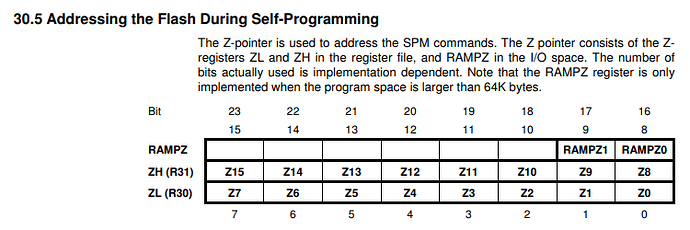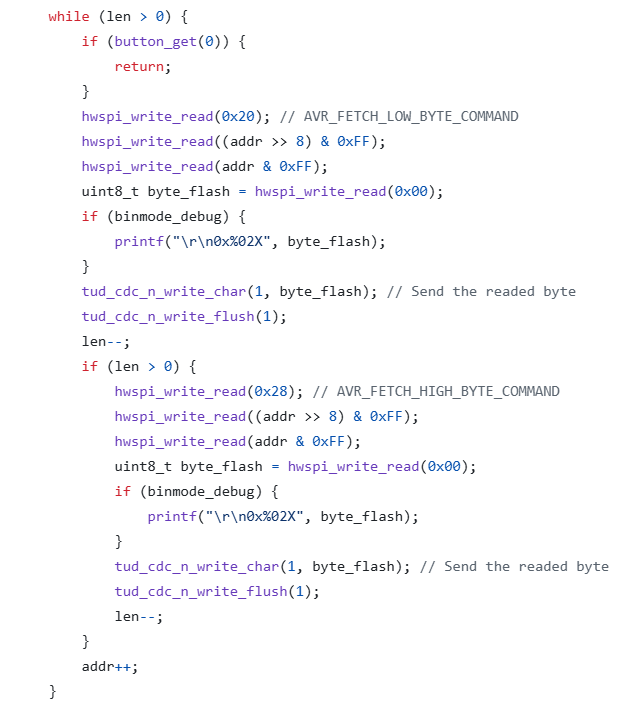Avrdude version 8.0
Copyright see avrdude/AUTHORS at main · avrdudes/avrdude · GitHub
System wide configuration file is C:\Program Files (x86)\AVRDUDESS\avrdude.conf
Using port : COM13
Using programmer : buspirate
Setting baud rate : 115200
AVR part : ATmega128
Programming modes : SPM, ISP, HVPP, JTAG, JTAGmkI
Memory Size Pg size
eeprom 4096 8
flash 131072 256
lfuse 1 1
hfuse 1 1
efuse 1 1
lock 1 1
prodsig/sigrow 24 1
sernum 10 1
io 224 1
sram 4096 1
calibration 4 1
signature 3 1
Variants Package F max T range V range
ATmega128-16AN TQFP64 16 MHz [-40 C, 105 C] [4.5 V, 5.5 V]
ATmega128-16ANR TQFP64 16 MHz [-40 C, 105 C] [4.5 V, 5.5 V]
ATmega128-16AU TQFP64 16 MHz [-40 C, 85 C] [4.5 V, 5.5 V]
ATmega128-16AUR TQFP64 16 MHz [-40 C, 85 C] [4.5 V, 5.5 V]
ATmega128-16MN MLF64 16 MHz [-40 C, 105 C] [4.5 V, 5.5 V]
ATmega128-16MNR MLF64 16 MHz [N/A, N/A] [4.5 V, 5.5 V]
ATmega128-16MU MLF64 16 MHz [-40 C, 85 C] [4.5 V, 5.5 V]
ATmega128-16MUR MLF64 16 MHz [-40 C, 85 C] [4.5 V, 5.5 V]
ATmega128L-8AN TQFP64 8 MHz [-40 C, 105 C] [3 V, 5.5 V]
ATmega128L-8ANR TQFP64 8 MHz [-40 C, 105 C] [3 V, 5.5 V]
ATmega128L-8AU TQFP64 8 MHz [-40 C, 85 C] [2.7 V, 5.5 V]
ATmega128L-8AUR TQFP64 8 MHz [-40 C, 85 C] [2.7 V, 5.5 V]
ATmega128L-8MN MLF64 8 MHz [-40 C, 105 C] [3 V, 5.5 V]
ATmega128L-8MNR MLF64 8 MHz [N/A, N/A] [2.7 V, 5.5 V]
ATmega128L-8MU MLF64 8 MHz [-40 C, 85 C] [2.7 V, 5.5 V]
ATmega128L-8MUR MLF64 8 MHz [-40 C, 85 C] [2.7 V, 5.5 V]
Programmer type : BusPirate
Description : The Bus Pirate in AVR programming mode
attempting to initiate BusPirate binary mode …
BusPirate binmode version: 1
BusPirate SPI version: 1
Paged flash write enabled
AVR Extended Commands version 1
AVR device initialized and ready to accept instructions
Reading | ################################################## | 100% 0.01s
Device signature = 1E 97 02 (ATmega128, ATmega128A)
Reading flash memory …
Reading | #################################################- | 99% 158.59s
Error buspirate_paged_load() buspirate.c 952: paged read command returned zero


